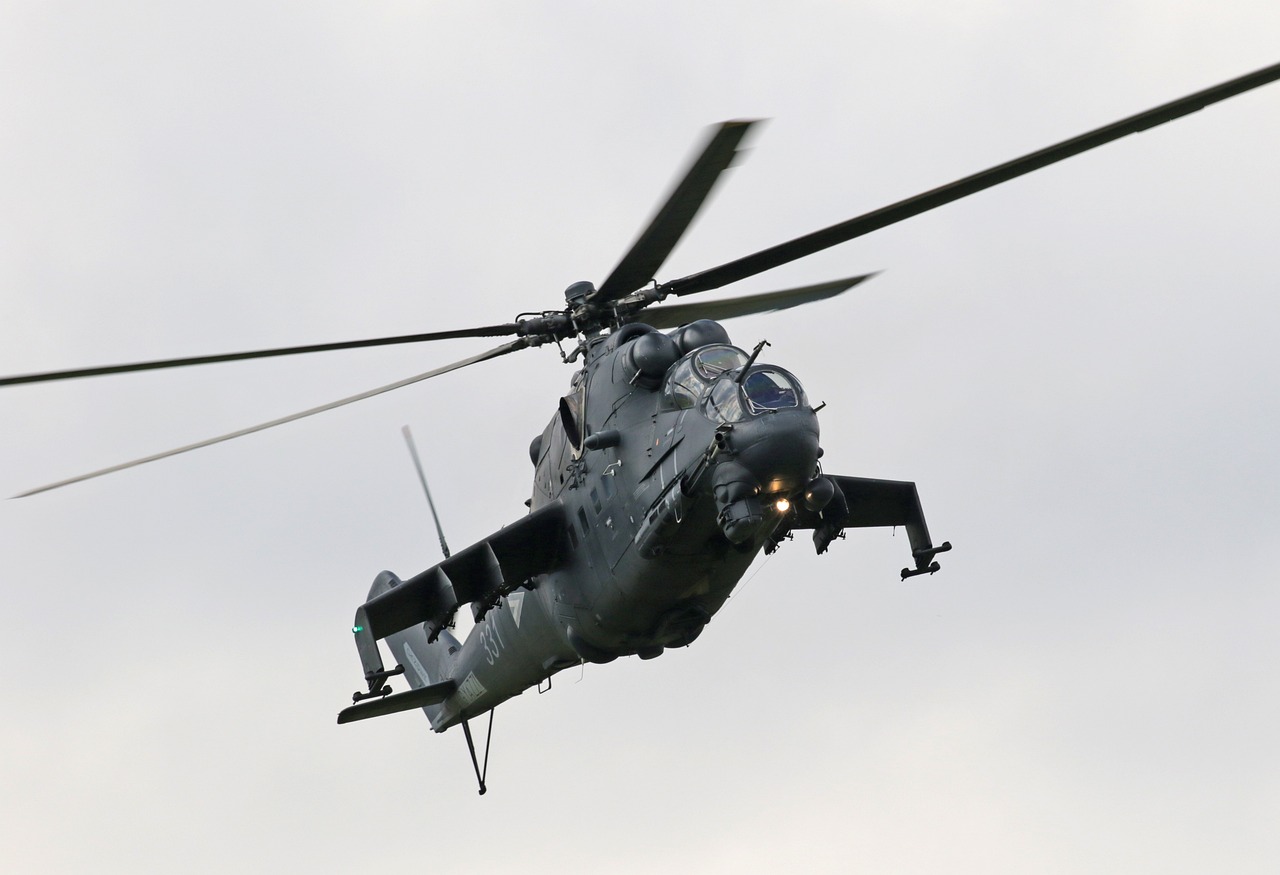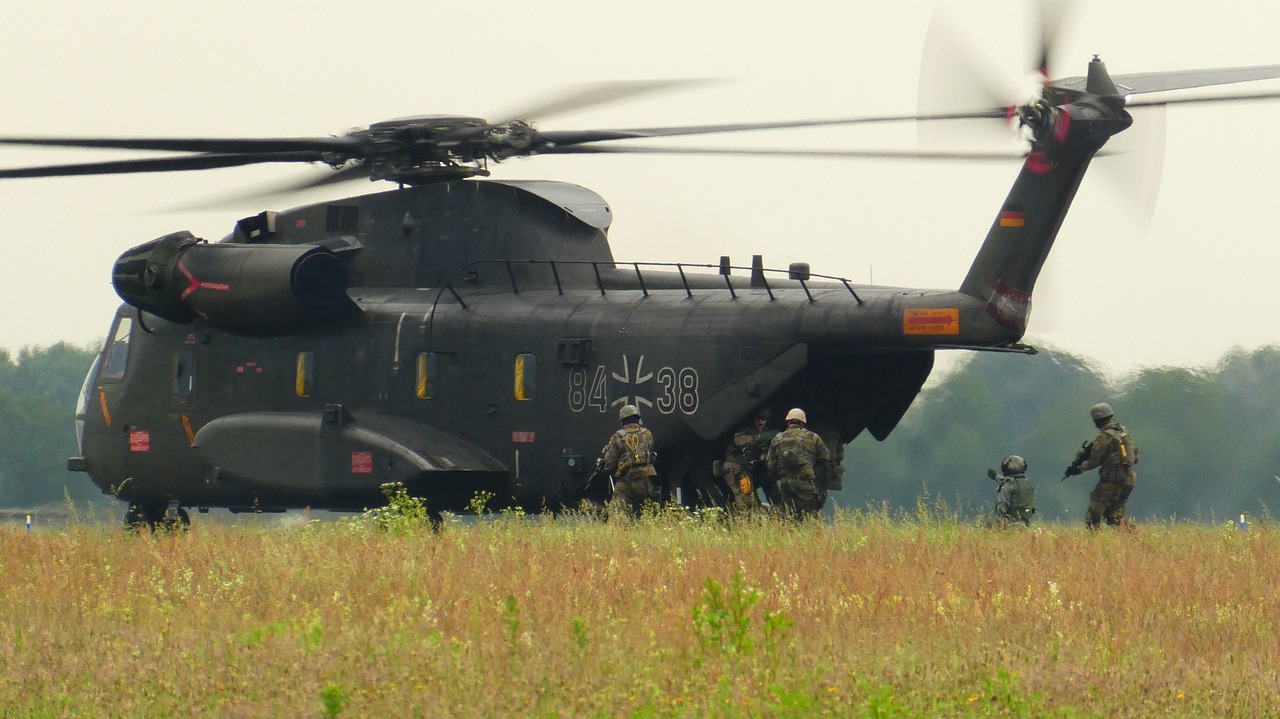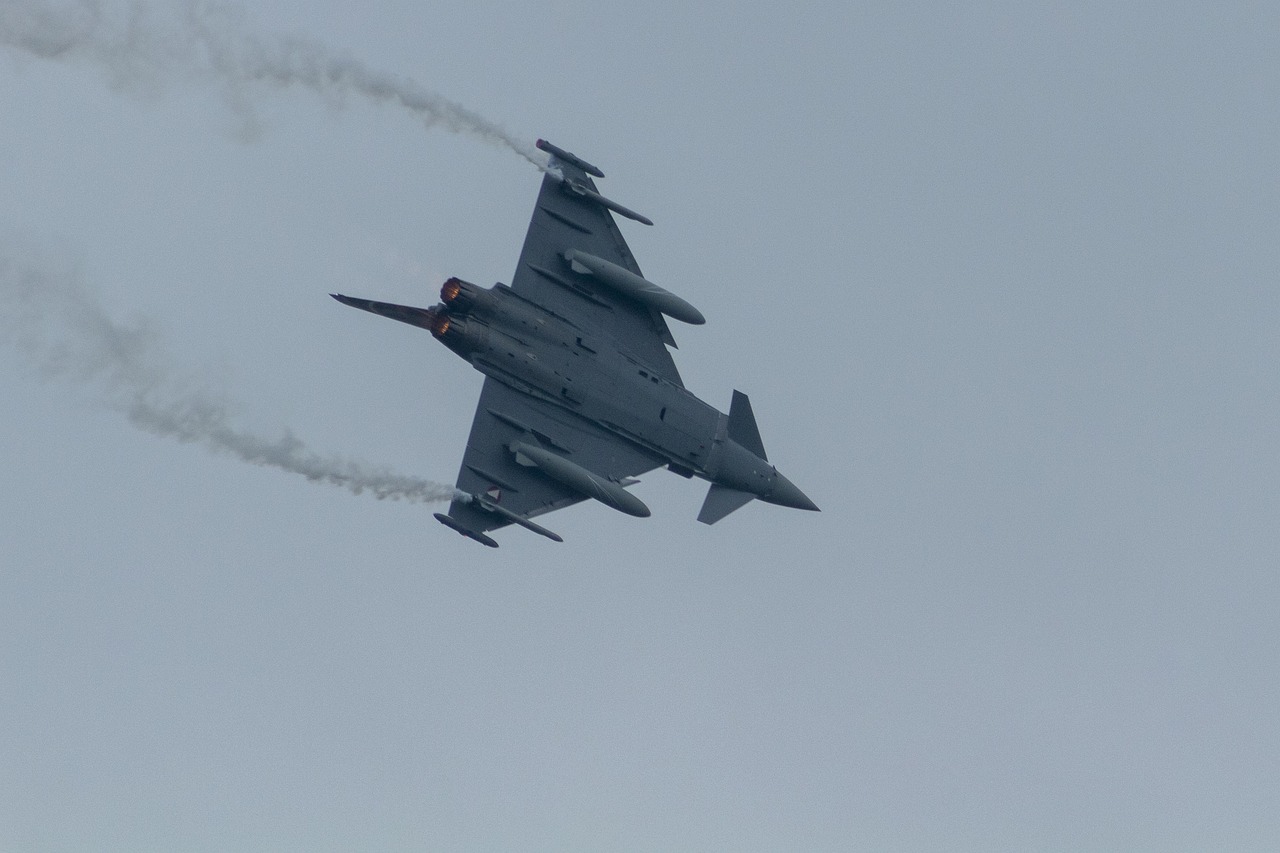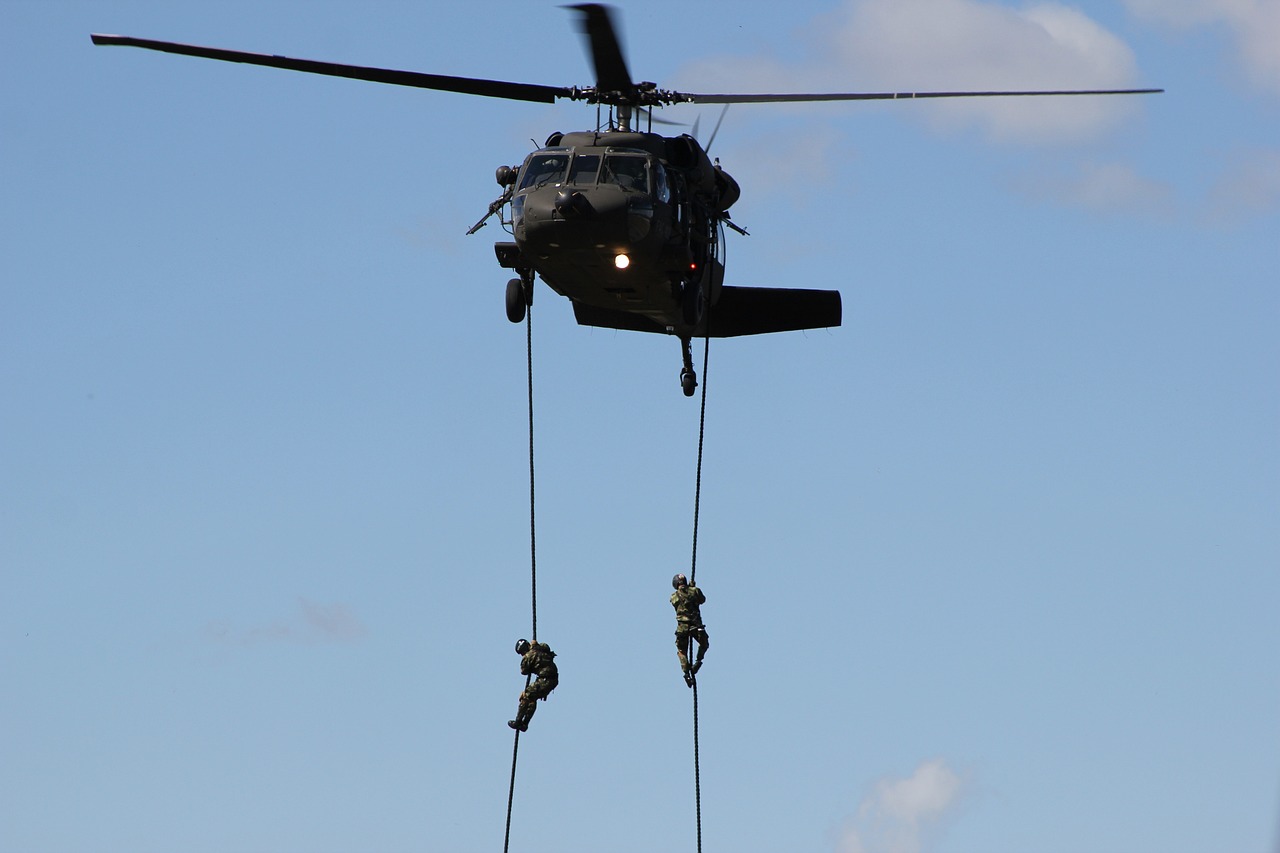The Impact of AI on Strategic Military Operations
The landscape of warfare is undergoing a seismic shift, and at the heart of this transformation lies artificial intelligence (AI). With its ability to process and analyze data at unprecedented speeds, AI is not just a tool; it is a game changer in the realm of military strategy. Imagine a battlefield where decisions are made in the blink of an eye, where data flows seamlessly, and where the fog of war is lifted by advanced algorithms. This is no longer a distant dream; it is the reality we are stepping into. As we delve into this topic, we will explore how AI is enhancing decision-making processes, reshaping operational tactics, and even raising ethical questions that challenge our understanding of warfare.
AI's influence is felt in various aspects of military operations, from autonomous weapons systems that can engage in combat without human intervention to intelligence gathering that provides comprehensive situational awareness. This technology is not just about efficiency; it’s about redefining what it means to conduct warfare. As we explore these facets, we will uncover not only the benefits but also the potential risks and ethical dilemmas that accompany the integration of AI into military strategies.
In this article, we will break down the multifaceted impact of AI on military operations, examining its role in decision-making, operational efficiency, intelligence analysis, and cyber warfare. Each section will highlight how AI is not merely an enhancement but a revolutionary force that is reshaping the future of military engagement. So, buckle up as we navigate through the intricate web of AI's influence on modern warfare!
Artificial intelligence enhances military decision-making by analyzing vast amounts of data quickly, providing actionable insights that can lead to more effective strategies and operations in real-time scenarios. Imagine a commander facing the chaos of battle, where every second counts. With AI, they can receive instant analysis of troop movements, enemy positions, and logistical needs, allowing for decisions that are not just informed, but optimized for success.
The development of autonomous weapons systems raises ethical and operational questions, as these AI-driven technologies can engage targets without human intervention, potentially changing the dynamics of warfare. The implications of such systems are profound, as they challenge traditional norms of engagement and accountability.
The use of AI in military operations brings forth significant ethical considerations, including accountability, the potential for misuse, and the moral responsibilities of deploying autonomous systems in combat. For instance, if an autonomous drone mistakenly targets civilians, who is responsible? The developer, the military, or the machine itself? This question is at the forefront of discussions surrounding AI in warfare.
Determining accountability for actions taken by AI systems in military contexts poses challenges, particularly when errors occur or unintended consequences arise during operations. The lack of clear lines of responsibility can lead to a dangerous precedent, where decisions are made by machines without human oversight.
Ensuring human oversight in AI-driven military operations is crucial to maintain ethical standards and prevent autonomous systems from making critical decisions without human intervention. The balance between leveraging AI's capabilities and retaining human judgment is delicate yet essential.
AI technologies contribute to operational efficiency by streamlining logistics, enhancing communication, and optimizing resource allocation, ultimately leading to improved mission success rates. For example, AI can predict supply chain needs, ensuring that troops are well-equipped without unnecessary delays. This level of efficiency can mean the difference between victory and defeat in critical operations.
AI significantly enhances intelligence gathering by processing and analyzing data from various sources, providing military leaders with comprehensive situational awareness and actionable intelligence. The ability to sift through mountains of information and extract relevant insights is invaluable in today's fast-paced military environment.
Data fusion techniques utilize AI to integrate information from diverse sources, improving the accuracy of intelligence assessments and enabling better-informed strategic decisions. By combining data from satellite imagery, reconnaissance reports, and social media, military leaders can gain a clearer picture of the battlefield.
Predictive analytics powered by AI can forecast potential threats and battlefield scenarios, allowing military planners to proactively prepare for and respond to emerging challenges. This foresight can be likened to having a weather forecast for military operations, helping to avoid storms before they hit.
AI plays a pivotal role in modern cyber warfare, where it can be used to enhance defensive measures, detect threats, and even conduct offensive operations against adversaries. The digital battlefield is just as critical as the physical one, and AI is at the forefront of this new arena.
AI-driven defensive measures improve the ability to identify and neutralize cyber threats in real-time, safeguarding military networks and sensitive information from potential breaches. Imagine a digital shield that adapts and learns from each attack, becoming stronger and more resilient with every encounter.
Utilizing AI in offensive cyber operations allows for more sophisticated attacks against enemy systems, increasing the effectiveness and precision of cyber warfare strategies. This capability can be compared to having a sniper's precision in the chaotic world of cyber combat, where every action counts.
- What is the role of AI in modern military operations? AI enhances decision-making, operational efficiency, and intelligence gathering, transforming how military strategies are developed and executed.
- Are autonomous weapons systems ethical? The ethics of autonomous weapons are debated, focusing on accountability and the potential for misuse in combat situations.
- How does AI improve intelligence gathering? AI processes and analyzes vast amounts of data, providing military leaders with actionable intelligence and comprehensive situational awareness.
- What are the risks of AI in warfare? Risks include ethical dilemmas, accountability issues, and the potential for misuse of technology in combat scenarios.

AI-Driven Decision Making
Artificial intelligence is revolutionizing the way military strategies are formulated and executed. Imagine having a powerful assistant that can sift through mountains of data in the blink of an eye, providing you with insights that could mean the difference between victory and defeat. This is precisely what AI brings to the table in military decision-making. By leveraging advanced algorithms and machine learning techniques, AI can analyze vast amounts of information—from satellite imagery to battlefield reports—at speeds that are simply beyond human capability.
One of the most striking aspects of AI-driven decision-making is its ability to provide real-time analysis. For instance, during a military operation, commanders can receive instant updates about troop movements, weather conditions, and enemy positions. This swift processing of data enables leaders to make informed decisions rapidly, adapting their strategies as situations evolve on the ground. The traditional military decision-making process, often bogged down by lengthy deliberations and human error, is transformed into a dynamic and responsive approach.
Furthermore, AI can identify patterns and trends that may not be immediately apparent to human analysts. For example, by examining historical conflict data, AI systems can predict potential flashpoints or areas where tensions might escalate. This predictive capability allows military planners to allocate resources more effectively and to prepare for possible scenarios before they unfold. Such foresight is invaluable, as it not only enhances operational readiness but also minimizes risks to personnel and equipment.
However, while the benefits of AI in decision-making are clear, it also introduces complexities. The reliance on AI systems raises questions about trust and reliability. Can military leaders fully trust the recommendations made by an algorithm? What happens if the system makes a mistake? To address these concerns, it is essential to implement robust validation processes and maintain a level of human oversight. After all, the stakes in military operations are incredibly high, and the cost of an error can be catastrophic.
In summary, AI-driven decision-making is a game-changer in military operations. It enhances the speed, accuracy, and effectiveness of strategic planning. As military forces continue to embrace these technologies, we can expect to see a profound shift in how wars are fought and won. The integration of AI not only empowers commanders with better information but also reshapes the very fabric of military strategy, making it more adaptive and responsive than ever before.
- How does AI improve military decision-making? AI enhances military decision-making by analyzing large datasets quickly, providing actionable insights that lead to more effective strategies.
- What are the risks associated with AI in military operations? The primary risks include reliance on potentially flawed algorithms and the ethical implications of delegating critical decisions to machines.
- Can AI predict future military scenarios? Yes, AI can analyze historical data and identify patterns to forecast potential threats and battlefield scenarios.
- Is human oversight necessary in AI-driven military operations? Absolutely. Human oversight is crucial to ensure ethical standards are maintained and to mitigate the risks of AI errors.

Autonomous Weapons Systems
As we delve into the realm of , it's essential to recognize the profound implications these technologies have on modern warfare. Imagine a battlefield where machines, equipped with advanced artificial intelligence, can make split-second decisions without human intervention. Sounds like science fiction, right? Yet, this is becoming our reality. These systems are designed to engage targets based on pre-programmed criteria and real-time data analysis, raising vital questions about the future of combat and the ethical landscape surrounding military operations.
One of the most pressing concerns is the ethical implications of allowing machines to decide who lives and dies. The idea of robots carrying out lethal operations without human oversight can be unsettling. This shift not only challenges traditional military paradigms but also forces us to reconsider our moral responsibilities in warfare. How do we ensure that these systems adhere to the principles of international humanitarian law? The potential for misuse or malfunction is significant, leading to unintended consequences that could escalate conflicts rather than resolve them.
Moreover, the operational dynamics of warfare are changing. With autonomous weapons, the speed of engagement can increase exponentially. Imagine a scenario where a drone equipped with AI can identify and neutralize threats faster than a human operator can react. This capability could provide a strategic advantage, but it also raises the stakes significantly. The autonomy of these systems means that once deployed, they operate independently, making it crucial to establish robust protocols for their use.
Let’s dig deeper into the ethical implications of these systems. As we integrate more AI into military operations, we face a moral dilemma: who is accountable when an autonomous weapon causes collateral damage? Is it the programmer, the military leader who deployed it, or the machine itself? These questions are not just theoretical; they are fundamental to the future of military ethics. The challenge lies in creating a framework that ensures accountability while embracing the technological advancements that AI offers.
Determining accountability in the context of autonomous systems is a complex issue. When an AI makes a decision, especially one that results in unintended harm, the lines of responsibility can become blurred. A table illustrating the potential accountability scenarios can help clarify this complexity:
| Scenario | Possible Accountability |
|---|---|
| Autonomous system misfires and causes civilian casualties | Programmer, military leadership, or AI system? |
| AI identifies a target incorrectly | Military protocol or AI training data? |
| AI system hacked and used against own forces | Cybersecurity measures or military oversight? |
This table highlights the intricate web of accountability that arises from the deployment of autonomous weapons. Each scenario presents unique challenges that require careful consideration and proactive measures to mitigate risks.
To address these ethical concerns, ensuring human oversight in the use of autonomous weapons is paramount. While AI can process information and execute tasks at lightning speed, the human element remains crucial in decision-making processes, especially in combat situations. The presence of a human operator can provide a necessary layer of judgment and ethical consideration that machines currently lack. We must ask ourselves: can we trust machines to make life-and-death decisions? The answer may lie in a balanced approach that combines the efficiency of AI with the moral compass of human oversight.
In conclusion, as autonomous weapons systems become more prevalent, we must navigate the complex interplay of technology, ethics, and accountability. The future of warfare is not just about who has the most advanced technology but also about how we choose to wield that power responsibly.
- What are autonomous weapons systems?
These are military systems that can operate without human intervention, making decisions based on AI algorithms. - Are there ethical concerns regarding autonomous weapons?
Yes, there are significant ethical implications, including accountability for actions taken by these systems. - How can we ensure accountability for autonomous weapons?
Establishing clear protocols and frameworks for military operations involving AI is crucial for accountability. - Is human oversight necessary in autonomous military operations?
Absolutely, human oversight is essential to maintain ethical standards and ensure responsible decision-making.

Ethical Implications
The integration of artificial intelligence (AI) into military operations is a double-edged sword that brings forth a myriad of . While AI has the potential to enhance efficiency and effectiveness on the battlefield, it also raises profound questions about morality, accountability, and the very nature of warfare itself. One of the most pressing concerns is the accountability for actions taken by AI systems. When an autonomous weapon makes a decision that leads to unintended casualties, who is responsible? Is it the programmer, the military command, or the machine itself? These questions challenge traditional notions of accountability in warfare.
Moreover, the potential for misuse of AI technologies is a significant concern. As these systems become more sophisticated, the risk of them being deployed in ways that contravene international laws and ethical standards increases. For instance, the use of AI in surveillance can lead to violations of privacy and civil liberties, not just on the battlefield but also in civilian contexts. The line between protecting national security and infringing on individual rights becomes increasingly blurred.
Another crucial aspect to consider is the moral responsibilities that come with deploying autonomous systems in combat. Military leaders must grapple with the implications of allowing machines to make life-and-death decisions. The dehumanization of warfare through automation can lead to a troubling detachment from the consequences of these actions. Soldiers may become less likely to empathize with the enemy, viewing them merely as data points rather than human beings. This shift in perspective can have long-lasting effects on military culture and the psychological well-being of those involved.
To illustrate these ethical implications further, consider the following points:
- Accountability Challenges: Determining who is liable for AI-driven actions in combat scenarios.
- Potential for Misuse: Risks associated with deploying AI for surveillance or offensive operations.
- Moral Responsibility: The ethical burden of allowing machines to make critical decisions in warfare.
As we move forward, it is essential to establish clear guidelines and ethical frameworks that govern the use of AI in military operations. This includes ensuring robust human oversight to maintain control over these systems and prevent them from operating independently in critical situations. The future of warfare will undoubtedly be shaped by these technologies, but it is up to us to steer their development in a direction that aligns with our moral values and ethical standards.
- What are the main ethical concerns regarding AI in military operations?
The primary concerns include accountability for AI decisions, the potential for misuse of technology, and the moral implications of allowing machines to engage in combat. - How can accountability be established in AI-driven military actions?
Establishing accountability requires clear guidelines on who is responsible for AI actions, whether it be the developers, military leaders, or the AI systems themselves. - What role does human oversight play in the use of AI in warfare?
Human oversight is crucial to ensure that AI systems do not operate independently in critical situations, maintaining ethical standards and accountability.

Accountability in Warfare
This article explores how artificial intelligence is transforming military strategies, enhancing decision-making processes, and reshaping the future of warfare through automation and advanced data analysis.
Artificial intelligence enhances military decision-making by analyzing vast amounts of data quickly, providing actionable insights that can lead to more effective strategies and operations in real-time scenarios.
The development of autonomous weapons systems raises ethical and operational questions, as these AI-driven technologies can engage targets without human intervention, potentially changing the dynamics of warfare.
The use of AI in military operations brings forth significant ethical considerations, including accountability, the potential for misuse, and the moral responsibilities of deploying autonomous systems in combat.
Determining accountability for actions taken by AI systems in military contexts poses complex challenges. Imagine a scenario where an autonomous drone mistakenly targets civilians instead of enemy combatants. Who is responsible? Is it the software developers, the military commanders, or the machine itself? This question of accountability is crucial and remains largely unanswered. The traditional framework of accountability in warfare, which often relies on human judgment, becomes murky when machines are making decisions.
Furthermore, the potential for errors increases when AI systems operate independently. A malfunction or a misinterpretation of data can lead to catastrophic outcomes, raising concerns about whether those behind the technology can be held liable. To navigate this intricate landscape, the military must consider establishing clear guidelines that delineate responsibility. This could involve:
- Creating a framework for accountability that includes all stakeholders involved in AI development and deployment.
- Implementing rigorous testing protocols to ensure AI systems function as intended before deployment.
- Establishing a legal framework that addresses the unique challenges posed by AI in warfare.
Ultimately, accountability in warfare with AI is not just a matter of legal responsibility; it is about maintaining ethical standards and ensuring that the use of technology aligns with human values. As we move forward, it is imperative that military leaders and technologists work together to create a balanced approach that prioritizes human oversight and ethical considerations.
Ensuring human oversight in AI-driven military operations is crucial to maintain ethical standards and prevent autonomous systems from making critical decisions without human intervention.
AI technologies contribute to operational efficiency by streamlining logistics, enhancing communication, and optimizing resource allocation, ultimately leading to improved mission success rates.
AI significantly enhances intelligence gathering by processing and analyzing data from various sources, providing military leaders with comprehensive situational awareness and actionable intelligence.
Data fusion techniques utilize AI to integrate information from diverse sources, improving the accuracy of intelligence assessments and enabling better-informed strategic decisions.
Predictive analytics powered by AI can forecast potential threats and battlefield scenarios, allowing military planners to proactively prepare for and respond to emerging challenges.
AI plays a pivotal role in modern cyber warfare, where it can be used to enhance defensive measures, detect threats, and even conduct offensive operations against adversaries.
AI-driven defensive measures improve the ability to identify and neutralize cyber threats in real-time, safeguarding military networks and sensitive information from potential breaches.
Utilizing AI in offensive cyber operations allows for more sophisticated attacks against enemy systems, increasing the effectiveness and precision of cyber warfare strategies.
- What are the main ethical concerns regarding AI in military operations?
Ethical concerns include accountability, potential misuse, and the moral implications of autonomous decision-making in combat. - How does AI enhance military decision-making?
AI analyzes large volumes of data quickly, providing actionable insights that improve strategy formulation and operational effectiveness. - What is the role of human oversight in AI military applications?
Human oversight is essential to ensure ethical standards are maintained and to prevent autonomous systems from making critical decisions without human intervention.

Human Oversight
In the realm of military operations, is not just a safeguard; it is an absolute necessity. As we increasingly integrate artificial intelligence into combat scenarios, the importance of human judgment becomes even more pronounced. Imagine a world where machines make life-and-death decisions without any human intervention. It sounds like a plot from a sci-fi movie, but it's a reality we are inching closer to. This raises a crucial question: How can we ensure that AI systems act ethically and responsibly in high-stakes environments?
To maintain ethical standards and accountability in military operations, a robust framework for human oversight must be established. This involves creating clear protocols that define the roles and responsibilities of human operators in conjunction with AI systems. For instance, military personnel should always have the final say when it comes to engaging targets, especially in complex and dynamic situations where the consequences of an AI's decision could be catastrophic.
Moreover, the integration of AI into military operations must come with rigorous training programs for personnel. This training should focus on understanding the capabilities and limitations of AI systems. After all, a soldier who comprehends how AI analyzes data can make more informed decisions, ensuring that technology serves as a tool rather than a crutch. Consider the analogy of a pilot flying a plane; while autopilot can handle many tasks, the pilot must remain vigilant and ready to take control at any moment. Similarly, military operators must stay engaged and ready to intervene when AI systems are deployed.
Another aspect to consider is the transparency of AI algorithms. Military personnel should have access to the decision-making processes of AI systems to understand how conclusions are drawn. This transparency fosters trust and allows for better oversight. If an AI system makes a mistake, understanding its reasoning can help in rectifying the issue and preventing future occurrences. Without this transparency, we risk creating a black box where decisions are made without accountability.
In conclusion, while AI holds immense potential to revolutionize military operations, it is imperative that we do not lose sight of the human element. The combination of and advanced technology can lead to a more effective and ethical military strategy. As we move forward, we must ask ourselves: Are we ready to embrace the future while ensuring that humanity remains at the helm?
- What is the role of human oversight in AI military operations? Human oversight ensures that ethical standards are maintained and that critical decisions are not left solely to AI systems.
- Why is transparency important in AI decision-making? Transparency allows military personnel to understand the reasoning behind AI decisions, fostering trust and accountability.
- How can military personnel be trained for AI integration? Training should focus on the capabilities and limitations of AI, as well as the importance of maintaining engagement during operations.
- What are the risks of relying solely on AI in military contexts? Sole reliance on AI can lead to ethical dilemmas, accountability issues, and potentially catastrophic mistakes in high-stakes situations.

Operational Efficiency
In the rapidly evolving landscape of military operations, has become a critical focus for armed forces worldwide. The integration of artificial intelligence (AI) technologies is revolutionizing how military organizations streamline their processes, enhance communication, and optimize resource allocation. Imagine a well-oiled machine, where each part works in harmony to achieve a common goal; this is what AI is bringing to the table in military contexts.
One of the most significant contributions of AI to operational efficiency is its ability to analyze and interpret vast amounts of data. Military operations generate an overwhelming amount of information, from logistics to personnel management. AI systems can process this data at lightning speed, identifying patterns and providing actionable insights that human analysts might miss. This capability allows for real-time adjustments to strategies, ensuring that military leaders can respond swiftly to changing circumstances on the ground.
Moreover, AI enhances communication within military units. With the aid of AI-driven platforms, information can be disseminated more effectively, ensuring that all members of a unit are on the same page. This improved communication fosters collaboration and coordination, which are essential for mission success. For instance, AI tools can prioritize messages based on urgency, allowing commanders to focus on critical updates without getting bogged down by less important information.
Resource allocation is another area where AI shines. By analyzing data related to supply chains, troop movements, and equipment availability, AI can help military planners make more informed decisions about where to allocate resources. This not only maximizes efficiency but also minimizes waste, ensuring that every asset is utilized to its fullest potential. For example, AI can predict which units will need supplies based on historical data and current operational demands, allowing for proactive planning rather than reactive measures.
To illustrate the impact of AI on operational efficiency, consider the following table that outlines the key areas of improvement:
| Area of Improvement | AI Contribution |
|---|---|
| Data Analysis | Rapid processing of large datasets to identify trends and insights. |
| Communication | Enhanced information dissemination and prioritization of critical updates. |
| Resource Allocation | Optimized distribution of supplies and equipment based on predictive analytics. |
| Logistics | Streamlined supply chain management through real-time data tracking. |
In conclusion, the infusion of AI technologies into military operations is not just a trend; it represents a fundamental shift in how armed forces operate. By enhancing operational efficiency, AI enables military leaders to make better-informed decisions, respond to threats more effectively, and ultimately increase the chances of mission success. As we look to the future, it is clear that the role of AI in military operations will only continue to grow, paving the way for a new era of warfare that is more efficient, effective, and responsive to the complexities of modern conflicts.
- How does AI improve decision-making in military operations? AI analyzes vast amounts of data quickly, providing actionable insights that lead to more effective strategies.
- What are autonomous weapons systems? These are AI-driven technologies that can engage targets without human intervention.
- What ethical concerns are associated with AI in military use? Key concerns include accountability, potential misuse, and the moral implications of autonomous systems making life-and-death decisions.
- How does AI enhance intelligence gathering? AI processes and analyzes data from various sources, offering comprehensive situational awareness.
- What role does AI play in cyber warfare? AI enhances defensive measures, detects threats, and can conduct offensive operations against adversaries.

Intelligence Gathering and Analysis
In today’s fast-paced military landscape, the ability to gather and analyze intelligence effectively is paramount. Artificial Intelligence (AI) has emerged as a game-changer in this realm, transforming how military leaders perceive and respond to threats. Imagine trying to find a needle in a haystack; now, picture having a supercharged magnet that not only finds the needle but also assesses its significance and potential impact. That’s the power of AI in intelligence gathering.
AI significantly enhances intelligence gathering by processing and analyzing data from a multitude of sources. This includes everything from satellite imagery and drone surveillance to social media feeds and intercepted communications. By leveraging advanced algorithms, AI can sift through this vast sea of information, identifying patterns and anomalies that might escape human analysts. The result? A comprehensive situational awareness that empowers military leaders to make informed decisions swiftly.
One of the key techniques in AI-driven intelligence analysis is data fusion. This approach integrates information from diverse sources, creating a more accurate and holistic view of the battlefield. For instance, by combining data from ground sensors, aerial reconnaissance, and human intelligence, military planners can develop a clearer picture of enemy movements and intentions. The table below illustrates the different sources of intelligence and how AI enhances their integration:
| Source of Intelligence | AI Enhancement |
|---|---|
| Satellite Imagery | Automated analysis of terrain and troop movements |
| Drone Surveillance | Real-time data processing for immediate threat assessment |
| Social Media Monitoring | Sentiment analysis to gauge public opinion and potential unrest |
| Intercepted Communications | Natural language processing to identify key information |
Furthermore, predictive analytics powered by AI can forecast potential threats and battlefield scenarios. This capability allows military planners to proactively prepare for and respond to emerging challenges. Think of it as having a crystal ball that not only predicts the future but also provides insights on how to navigate it. By analyzing historical data and current trends, AI can highlight likely enemy actions, enabling preemptive strategies that can save lives and resources.
In conclusion, the integration of AI in intelligence gathering and analysis is not just a technological advancement; it is a revolutionary shift that enhances military effectiveness. The ability to process vast amounts of data rapidly and accurately allows for better-informed decisions, ultimately leading to improved operational success. As we continue to explore the frontiers of AI, the military’s approach to intelligence will undoubtedly evolve, paving the way for a new era of strategic warfare.
- How does AI improve intelligence gathering?
AI improves intelligence gathering by processing large volumes of data quickly, identifying patterns, and providing actionable insights that enhance situational awareness. - What are data fusion techniques?
Data fusion techniques integrate information from various sources to create a comprehensive understanding of a situation, improving the accuracy of intelligence assessments. - Can AI predict future threats?
Yes, AI utilizes predictive analytics to forecast potential threats and battlefield scenarios, enabling military planners to prepare proactively. - What role does human oversight play in AI-driven intelligence?
Human oversight is crucial to ensure ethical standards are maintained and to interpret AI-generated insights within the broader context of military operations.

Data Fusion Techniques
This article explores how artificial intelligence is transforming military strategies, enhancing decision-making processes, and reshaping the future of warfare through automation and advanced data analysis.
Artificial intelligence enhances military decision-making by analyzing vast amounts of data quickly, providing actionable insights that can lead to more effective strategies and operations in real-time scenarios.
The development of autonomous weapons systems raises ethical and operational questions, as these AI-driven technologies can engage targets without human intervention, potentially changing the dynamics of warfare.
The use of AI in military operations brings forth significant ethical considerations, including accountability, the potential for misuse, and the moral responsibilities of deploying autonomous systems in combat.
Determining accountability for actions taken by AI systems in military contexts poses challenges, particularly when errors occur or unintended consequences arise during operations.
Ensuring human oversight in AI-driven military operations is crucial to maintain ethical standards and prevent autonomous systems from making critical decisions without human intervention.
AI technologies contribute to operational efficiency by streamlining logistics, enhancing communication, and optimizing resource allocation, ultimately leading to improved mission success rates.
AI significantly enhances intelligence gathering by processing and analyzing data from various sources, providing military leaders with comprehensive situational awareness and actionable intelligence.
Data fusion techniques utilize artificial intelligence to integrate information from diverse sources, enhancing the accuracy and reliability of intelligence assessments. By combining data from various platforms—such as satellite imagery, drone surveillance, and ground reports—military analysts can create a more holistic view of the battlefield. This integration allows for better-informed strategic decisions, which can be the difference between success and failure in military operations.
Imagine trying to solve a complex puzzle; each piece represents a different piece of information. Alone, they might not tell the whole story, but when put together, they reveal the bigger picture. AI-driven data fusion acts as the glue that holds these pieces together, ensuring that military leaders have access to comprehensive insights.
Moreover, data fusion can be categorized into several techniques, including:
- Sensor Fusion: Combining data from multiple sensors to improve detection and tracking of objects.
- Information Fusion: Integrating information from various sources to enhance situational awareness.
- Decision Fusion: Merging different decision-making processes to optimize strategic planning.
These techniques not only improve the accuracy of intelligence assessments but also enable faster response times in dynamic combat situations. In a world where every second counts, the ability to rapidly synthesize and analyze data can provide a significant tactical advantage.
AI plays a pivotal role in modern cyber warfare, where it can be used to enhance defensive measures, detect threats, and even conduct offensive operations against adversaries.
AI-driven defensive measures improve the ability to identify and neutralize cyber threats in real-time, safeguarding military networks and sensitive information from potential breaches.
Utilizing AI in offensive cyber operations allows for more sophisticated attacks against enemy systems, increasing the effectiveness and precision of cyber warfare strategies.
- What are data fusion techniques in military operations?
Data fusion techniques involve integrating information from multiple sources to provide a comprehensive understanding of the battlefield, enhancing decision-making and strategic planning.
- How does AI improve military decision-making?
AI improves military decision-making by analyzing large volumes of data quickly, offering actionable insights that lead to more effective strategies and operations.
- What are the ethical concerns regarding autonomous weapons?
Ethical concerns include accountability for actions taken by AI, the potential for misuse, and the moral implications of deploying autonomous systems in combat scenarios.

Predictive Analytics
Predictive analytics is revolutionizing the way military strategists anticipate threats and prepare for various scenarios on the battlefield. By harnessing the power of artificial intelligence, military leaders can analyze historical data and uncover patterns that inform future operations. Imagine having a crystal ball that not only reveals potential challenges but also provides insights on how to tackle them effectively. That's precisely what predictive analytics offers to modern warfare.
At its core, predictive analytics uses advanced algorithms and machine learning techniques to sift through vast datasets, identifying trends and making forecasts. This capability allows military personnel to stay one step ahead of adversaries. For instance, by analyzing troop movements, weather conditions, and geopolitical factors, AI can predict potential hotspots for conflict or even foresee the likelihood of an enemy attack. This proactive approach can significantly enhance operational readiness and mission success rates.
Moreover, predictive analytics can be applied in various areas, including logistics, resource allocation, and personnel management. By predicting equipment failures or supply chain disruptions, military planners can take preemptive actions to mitigate risks. For example, if data indicates that a specific type of vehicle is prone to breakdowns in a particular environment, the military can adjust maintenance schedules or deploy additional resources to ensure operational continuity.
To illustrate the effectiveness of predictive analytics in military operations, consider the following table that outlines the key benefits and applications of this technology:
| Benefit | Application |
|---|---|
| Enhanced Threat Detection | Identifying potential attacks before they occur by analyzing patterns in data. |
| Resource Optimization | Allocating supplies and personnel where they are needed most based on predictive models. |
| Improved Training | Forecasting training needs and adjusting programs to better prepare troops for future scenarios. |
| Strategic Planning | Informed decision-making regarding military engagements and resource deployment. |
In conclusion, the integration of predictive analytics into military operations represents a significant leap forward in strategic planning. By leveraging AI to forecast potential outcomes, military leaders can make better-informed decisions that not only enhance operational efficiency but also save lives. As technology continues to evolve, the potential applications of predictive analytics in warfare will only expand, paving the way for more sophisticated and effective military strategies.
- What is predictive analytics in military operations?
Predictive analytics involves using data analysis and machine learning techniques to forecast potential threats and outcomes in military scenarios, allowing for better strategic planning.
- How does AI enhance predictive analytics?
AI enhances predictive analytics by quickly processing vast amounts of data, identifying patterns, and providing actionable insights that inform military decision-making.
- What are some applications of predictive analytics in the military?
Applications include threat detection, resource optimization, training improvements, and strategic planning, all aimed at enhancing operational effectiveness.

Cyber Warfare and AI
In today's digital battleground, artificial intelligence (AI) is not just a tool; it’s a game changer in the realm of cyber warfare. As military operations increasingly rely on technology, the integration of AI into cyber strategies is revolutionizing how nations defend themselves and engage in offensive operations. Imagine a world where systems can autonomously detect and neutralize cyber threats before they even manifest. This is not science fiction; it’s the reality we are moving toward.
AI plays a pivotal role in enhancing defensive measures against cyber threats. With the ability to analyze vast amounts of data at lightning speed, AI systems can identify anomalies and potential breaches in real-time. This capability allows military networks to respond to threats more swiftly than ever before. For instance, AI can monitor network traffic patterns, learning what is normal and flagging any irregularities that could indicate a cyber attack. This proactive approach not only protects sensitive information but also ensures that military operations remain uninterrupted.
On the offensive side, AI is equally transformative. Utilizing AI in offensive cyber operations enables military forces to conduct sophisticated attacks against enemy systems with unparalleled precision. By employing machine learning algorithms, military strategists can simulate various attack scenarios, optimizing their tactics to exploit vulnerabilities in adversary networks. This level of strategic planning is akin to playing a game of chess, where each move is calculated to outsmart the opponent. The result? A more effective and efficient cyber warfare strategy that can decisively impact the outcome of conflicts.
However, the use of AI in cyber warfare also raises significant questions and challenges. As military forces harness the power of AI, they must also consider the potential for misuse and the implications of autonomous decision-making in cyber operations. What happens when an AI system mistakenly identifies a non-threatening entity as a target? The potential for unintended consequences looms large, necessitating a careful balance between the benefits of AI and the ethical considerations that come with it.
In summary, the integration of AI into cyber warfare is reshaping the landscape of military operations. From enhancing defensive measures to enabling precise offensive capabilities, AI is proving to be an invaluable asset. However, as we embrace these advancements, we must remain vigilant about the ethical implications and strive to maintain oversight to ensure that these powerful tools are used responsibly.
- What role does AI play in cyber warfare?
AI enhances both defensive and offensive capabilities in cyber warfare, allowing for real-time threat detection and sophisticated attack strategies. - Are there ethical concerns associated with AI in military operations?
Yes, ethical concerns include accountability for AI actions, potential misuse, and the need for human oversight in critical decisions. - How does AI improve defensive measures in cyber warfare?
AI analyzes network traffic and identifies anomalies, enabling quicker responses to potential cyber threats. - Can AI lead to unintended consequences in military operations?
Absolutely, misidentification of targets by AI systems can lead to significant unintended consequences in military contexts.

Defensive Measures
In the ever-evolving landscape of warfare, have taken on a new dimension thanks to the integration of artificial intelligence (AI). Traditional defense strategies relied heavily on human intuition and static systems, but with AI, military forces can now deploy dynamic and adaptive responses to cyber threats. Imagine a digital fortress that not only stands guard but also learns from every attack it faces. This is the essence of AI-driven defensive measures in modern military operations.
AI technologies are revolutionizing the way military networks defend against cyber threats. By leveraging real-time data analysis, these systems can identify anomalies and potential breaches almost instantaneously. For instance, AI can monitor network traffic, detect unusual patterns, and respond to threats faster than any human operator could. This capability is akin to having a vigilant sentry who never sleeps, constantly scanning for intrusions and ready to act at a moment's notice.
Moreover, the predictive capabilities of AI allow for proactive defense strategies. Instead of merely reacting to attacks, military forces can anticipate potential threats based on historical data and emerging trends. This forward-thinking approach enables them to fortify their defenses before an attack occurs. For example, if an AI system detects a surge in phishing attempts targeting military personnel, it can automatically implement additional security measures, such as enhanced training and updated protocols, to mitigate the risk.
To better understand the impact of AI on defensive measures, consider the following table that outlines key features of AI-enhanced cybersecurity systems:
| Feature | Description |
|---|---|
| Real-Time Monitoring | Continuous surveillance of network activity to detect anomalies. |
| Automated Response | Immediate action taken against identified threats without human intervention. |
| Threat Intelligence | Utilization of data from past incidents to predict and prevent future attacks. |
| Adaptive Learning | Systems that evolve and improve their defenses based on new threat data. |
Additionally, AI can enhance the collaboration between different branches of the military. By sharing threat intelligence and insights generated from AI analysis, forces can create a unified front against cyber adversaries. This collaboration is crucial in a world where attacks can come from multiple fronts and in various forms, from ransomware to sophisticated hacking attempts.
However, it's essential to recognize that while AI significantly boosts defensive capabilities, it is not infallible. Cyber adversaries are also leveraging AI to develop more advanced tactics. Therefore, a continuous cycle of improvement and adaptation is necessary. Military leaders must ensure that their AI systems are regularly updated and that personnel are trained to understand and work alongside these technologies. The integration of human expertise with AI's capabilities creates a robust defense mechanism that can withstand the challenges of modern warfare.
In conclusion, AI-driven defensive measures represent a transformative shift in military strategies. By enhancing real-time monitoring, enabling automated responses, and fostering collaboration, military forces can safeguard their networks more effectively than ever before. As we move forward, the synergy between human intelligence and artificial intelligence will be pivotal in maintaining the upper hand in cyber warfare.
- How does AI improve cyber defense?
AI improves cyber defense by providing real-time monitoring, automated responses, and predictive analytics to anticipate and mitigate threats. - What are the risks associated with AI in military operations?
While AI enhances capabilities, it also brings risks such as over-reliance on technology and the potential for adversaries to exploit AI vulnerabilities. - Can AI completely replace human operators in defense systems?
No, AI is designed to augment human capabilities, not replace them. Human oversight remains crucial to ensure ethical and effective operations.

Offensive Capabilities
This article explores how artificial intelligence is transforming military strategies, enhancing decision-making processes, and reshaping the future of warfare through automation and advanced data analysis.
Artificial intelligence enhances military decision-making by analyzing vast amounts of data quickly, providing actionable insights that can lead to more effective strategies and operations in real-time scenarios.
The development of autonomous weapons systems raises ethical and operational questions, as these AI-driven technologies can engage targets without human intervention, potentially changing the dynamics of warfare.
The use of AI in military operations brings forth significant ethical considerations, including accountability, the potential for misuse, and the moral responsibilities of deploying autonomous systems in combat.
Determining accountability for actions taken by AI systems in military contexts poses challenges, particularly when errors occur or unintended consequences arise during operations.
Ensuring human oversight in AI-driven military operations is crucial to maintain ethical standards and prevent autonomous systems from making critical decisions without human intervention.
AI technologies contribute to operational efficiency by streamlining logistics, enhancing communication, and optimizing resource allocation, ultimately leading to improved mission success rates.
AI significantly enhances intelligence gathering by processing and analyzing data from various sources, providing military leaders with comprehensive situational awareness and actionable intelligence.
Data fusion techniques utilize AI to integrate information from diverse sources, improving the accuracy of intelligence assessments and enabling better-informed strategic decisions.
Predictive analytics powered by AI can forecast potential threats and battlefield scenarios, allowing military planners to proactively prepare for and respond to emerging challenges.
AI plays a pivotal role in modern cyber warfare, where it can be used to enhance defensive measures, detect threats, and even conduct offensive operations against adversaries.
Utilizing AI in offensive cyber operations allows for more sophisticated attacks against enemy systems, increasing the effectiveness and precision of cyber warfare strategies. Imagine a digital battlefield where AI algorithms can analyze vulnerabilities in real-time, pinpointing weaknesses in an adversary's defenses with unparalleled speed. This capability not only enhances the potential for successful strikes but also minimizes the risk of collateral damage that could arise from less precise methods.
One of the most compelling advantages of AI in offensive operations is its ability to execute complex strategies that would be impossible for human operators to manage alone. For instance, AI can autonomously launch coordinated attacks across multiple fronts, utilizing various cyber tactics such as:
- Phishing Attacks: AI can craft personalized phishing emails that are more likely to deceive the recipient.
- Denial of Service (DoS) Attacks: AI can orchestrate large-scale DoS attacks that overwhelm enemy networks.
- Malware Deployment: AI systems can develop and deploy malware that adapts to countermeasures in real-time.
Furthermore, AI can analyze the responses of enemy systems to its offensive maneuvers, learning and adapting its strategies on the fly. This creates a dynamic combat environment where the adversary must constantly react to AI-driven tactics, leading to a significant strategic advantage.
However, with great power comes great responsibility. The deployment of AI in offensive operations raises critical questions about the implications of such capabilities. As military forces increasingly rely on AI to conduct cyber warfare, the potential for unintended consequences grows. This necessitates robust frameworks for governance and oversight to ensure that AI's offensive capabilities are used judiciously and ethically.
- What are the primary benefits of AI in military operations? AI enhances decision-making, improves operational efficiency, and provides advanced data analysis for better intelligence gathering.
- Are there ethical concerns with the use of autonomous weapons? Yes, there are significant ethical implications, including accountability and the potential for misuse of autonomous systems.
- How does AI improve cyber warfare strategies? AI allows for more precise and sophisticated offensive and defensive cyber operations, enhancing the overall effectiveness of military strategies.
- Is human oversight necessary in AI-driven military operations? Absolutely, human oversight is crucial to maintain ethical standards and prevent autonomous systems from making critical decisions without human intervention.
Frequently Asked Questions
-
How is AI enhancing military decision-making?
AI enhances military decision-making by rapidly analyzing vast amounts of data, providing actionable insights that enable military leaders to formulate more effective strategies in real-time scenarios. This capability allows for quicker responses to dynamic battlefield conditions, ultimately improving operational success.
-
What are autonomous weapons systems?
Autonomous weapons systems are AI-driven technologies capable of engaging targets without direct human intervention. While they promise increased efficiency and precision, they also raise significant ethical and operational questions regarding accountability and the potential for misuse in combat situations.
-
What ethical implications arise from using AI in military operations?
The use of AI in military operations brings forth critical ethical considerations, such as accountability for actions taken by AI systems, the potential for unintended consequences, and the moral responsibilities of deploying these technologies in warfare. These factors necessitate careful deliberation to ensure ethical standards are upheld.
-
Why is human oversight important in AI-driven military operations?
Human oversight is crucial in AI-driven military operations to maintain ethical standards and prevent autonomous systems from making critical decisions without human intervention. This oversight helps ensure that military actions align with legal and moral frameworks, thereby safeguarding against potential misuse.
-
How does AI improve operational efficiency in the military?
AI contributes to operational efficiency by streamlining logistics, enhancing communication, and optimizing resource allocation. These improvements lead to better mission planning and execution, ultimately increasing the success rates of military operations.
-
What role does AI play in intelligence gathering?
AI significantly enhances intelligence gathering by processing and analyzing data from various sources. This capability provides military leaders with comprehensive situational awareness and actionable intelligence, enabling them to make informed strategic decisions.
-
What are data fusion techniques in military intelligence?
Data fusion techniques utilize AI to integrate information from diverse sources, improving the accuracy of intelligence assessments. By combining data effectively, military planners can make better-informed decisions and respond more adeptly to emerging threats.
-
How does predictive analytics benefit military planning?
Predictive analytics powered by AI can forecast potential threats and battlefield scenarios. This foresight allows military planners to proactively prepare for challenges, ensuring that they are ready to respond to various situations that may arise in combat.
-
What is the significance of AI in cyber warfare?
AI plays a pivotal role in modern cyber warfare by enhancing defensive measures, detecting threats, and even conducting offensive operations against adversaries. Its ability to analyze vast amounts of data quickly makes it an essential tool for maintaining cybersecurity in military networks.
-
How do AI-driven defensive measures work in cyber warfare?
AI-driven defensive measures improve the ability to identify and neutralize cyber threats in real-time. By analyzing traffic patterns and detecting anomalies, AI can safeguard military networks and sensitive information from potential breaches, thereby strengthening overall security.
-
What are the offensive capabilities of AI in cyber operations?
Utilizing AI in offensive cyber operations allows for more sophisticated attacks against enemy systems. This increased effectiveness and precision in cyber warfare strategies enable military forces to disrupt adversaries' operations and protect their own interests more effectively.



















